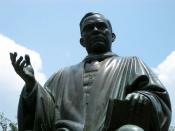Fibromyalgia was once dismissed by many traditional medical practitioners as a phantom illness.
But that view is changing rapidly. Not only is fibromyalgia accepted as a diagnosable illness, it is also a syndrome that researchers are finding more complicated as new information emerges.
As recently as a year ago, many physicians still associated some of fibromyalgia's symptoms with emotional problems, but that's no longer the case.
A simple description of fibromyalgia is that it is a chronic syndrome characterized by widespread muscle pain and fatigue.
For still unknown reasons, people with fibromyalgia have increased sensitivity to pain that occurs in areas called their "tender points." Common ones are the front of the knees, the elbows, the hip joints, the neck and spine. People may also experience sleep disturbances, morning stiffness, irritable bowel syndrome, anxiety and other symptoms.
According to the American College of Rheumatology, fibromyalgia affects 3 million to 6 million Americans, 80 percent to 90 percent of whom are women.
The condition is most often diagnosed during middle age, but at least one of its symptoms appears earlier in life.
But is there a psychological tie-in strong enough to differentiate fibromyalgia from other similar diseases and conditions? Apparently not.
"Fibromyalgia patients are such a diverse group of patients, they cannot all be the same," said Dr. Thorsten Giesecke, a University of Michigan research fellow.
Giesecke and his colleagues evaluated 97 fibromyalgia patients, including 85 women and 12 men. The patients underwent a two-day series of tests, answering questions about their coping strategies and personality traits -- particularly their emotional well-being. They were also tested for sensitivity to pressure and pain.
"It's generally been thought that fibromyalgia patients who have higher distress have higher pain sensitivities," Giesecke said.
In other words, it was believed that those with fibromyalgia who were...


